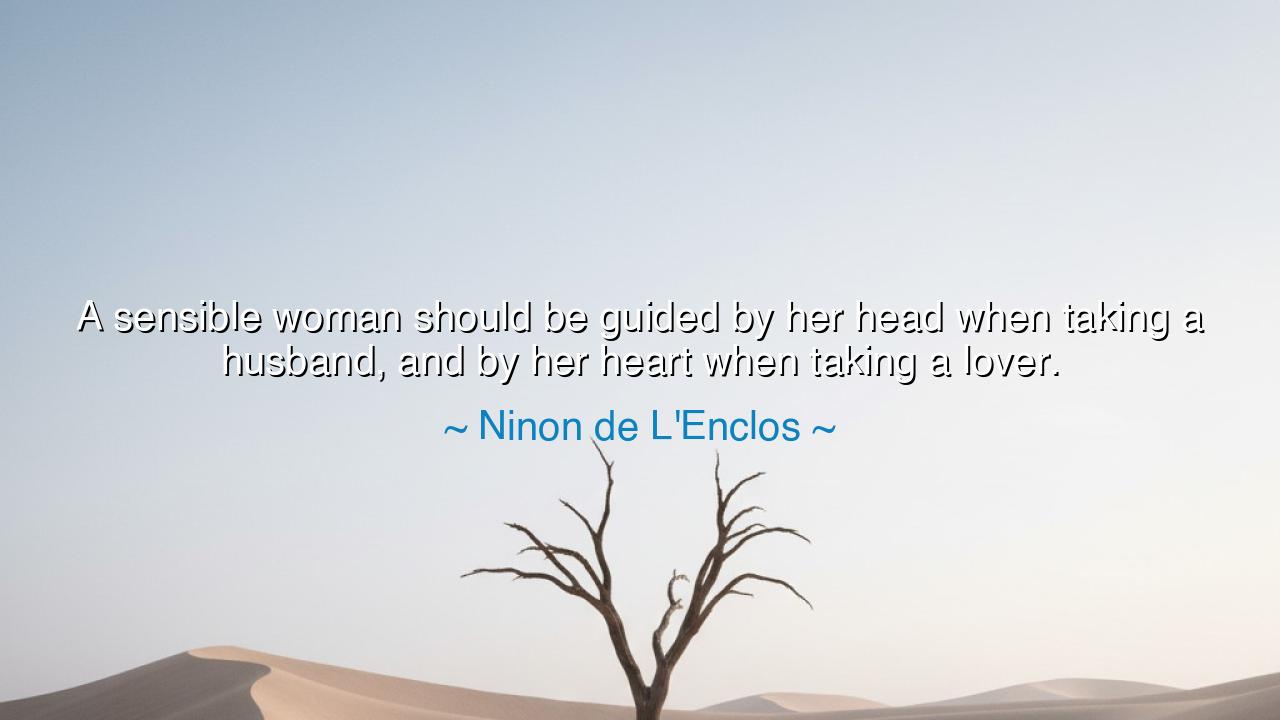
A sensible woman should be guided by her head when taking a
A sensible woman should be guided by her head when taking a husband, and by her heart when taking a lover.






Hear the daring words of Ninon de L’Enclos, the courtesan-philosopher of seventeenth-century France, who proclaimed: “A sensible woman should be guided by her head when taking a husband, and by her heart when taking a lover.” In this saying lies the sharp wisdom of one who lived beyond convention, who knew both the fire of passion and the cold weight of society’s expectations. It is a teaching woven of realism and desire, practicality and freedom.
To choose a husband with the head is to acknowledge the bonds of law, family, and society. Marriage in her age was often less a covenant of love than a contract of power, property, and alliance. Thus the wise woman, she counsels, must see with clear eyes, weighing character, stability, and security. To be sensible is not to scorn love, but to guard one’s life against ruin in a world that rarely favored women with freedom.
Yet when she turns to the lover, Ninon speaks of the heart. Here, at last, passion is permitted its reign. Love outside the confines of duty is, in her view, the realm of desire, joy, and the pursuit of beauty. To take a lover by the heart is to indulge in the sweetness of affection without calculation, to drink deeply of life’s poetry. This, she suggests, is where true intimacy and vitality are found—unguarded, unbound, unmeasured.
Her words reveal the conflict of her time, when women were expected to marry for advantage, yet longed for tenderness. Ninon de L’Enclos, famed for her wit and independence, embodied this duality. She saw clearly that life demanded prudence in one sphere and passion in another, and she counseled women to balance both without shame.
Thus let the teaching endure: in matters of survival, let reason rule; in matters of passion, let the heart sing. Though her counsel may strike as bold or even scandalous, its essence is this—that wisdom and love are not enemies but companions, and to live fully, a woman must honor both. For in the union of head and heart lies not only survival, but the fullness of life itself.






AHNgoc Anh Ha
I find this quote interesting, but I wonder if it oversimplifies the complexity of relationships. Can we really choose to guide our decisions solely by reason when choosing a life partner, and only by passion with a lover? Doesn’t every relationship require both emotional connection and intellectual compatibility? Is there truly a clear distinction between the two kinds of love, or do they often overlap more than we realize?
TPTrang Phan
Ninon de L'Enclos' words seem to reflect the classic idea that we need to balance practicality and passion in relationships. But how realistic is it to approach one type of relationship with logic and another with only emotion? Isn’t it dangerous to place love and commitment in two separate categories? Can a relationship based purely on passion truly be fulfilling, or does it need a balance of both heart and head?
THLe Tien Ho
This quote strikes me as a bit traditional, especially in its suggestion that a woman should use different criteria when choosing a husband and a lover. Does this perpetuate the idea that certain relationships should be based on reason while others are about passion? Is it possible for both love and logic to coexist, or is the heart always at odds with the mind in relationships of any kind?
TNPham Thanh Ngoc
Ninon de L'Enclos' quote seems to suggest that a woman should approach different kinds of relationships with distinct mindsets. But is it really wise to separate our emotions and intellect in matters of love? Shouldn't both the head and heart play an equally important role in any relationship, whether it’s a husband or lover? What happens when these two aspects conflict? Can we ever truly separate logic and passion in relationships?